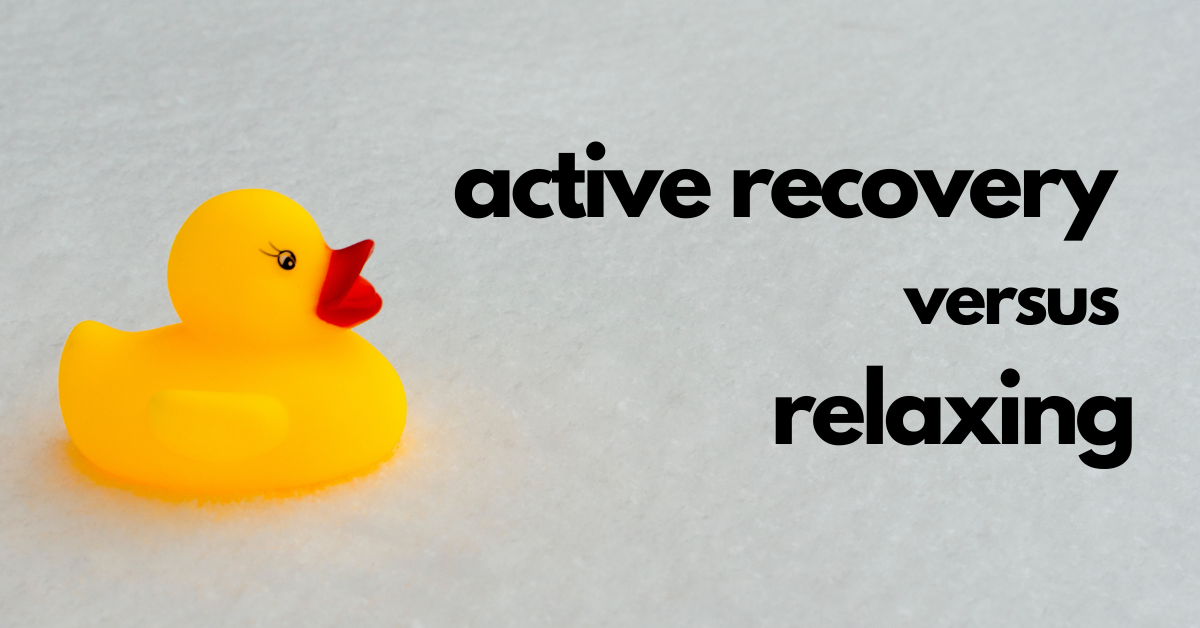
The fact that you’re reading this means you're more likely than most people to be a high performing individual.
But that also means you probably have some work ahead of you. You see, most successful and progressive personality types don't enjoy the recovery process because they see it as a distraction from their goals.
Therefore, recovery is something that we have to be gritty about.
We like to think about there being two types of recovery:
We want to focus on Active Recovery as, from a neuroscience perspective, it’s a powerful tool and will lead you to peak performance. Science shows that passive recovery will not.
What’s the difference?
Let’s consider some examples. It’s not uncommon for people to refer to ‘having a glass of wine or a beer and watching Netflix on the couch’ as their form of ‘switching off’ after work. But here’s the rub, whilst that may feel relaxing ‘in the moment’, you’re actually hindering the recovery and replenishment of your brain.
So relaxing does not necessarily equate to recovering.
Your brain's two principal focus chemicals are Dopamine and Norepinephrine. When you’re operating at your most intense these two neurochemicals last about 20 minutes.
Don’t believe us?
It's not a coincidence that TED talks are 20 minutes long. This is how long most of us can focus intently for one period of time until these two magical neurochemicals start to deplete.
You may not consciously notice it but every time they do a ‘quick cut’ the experts in the editing department are triggering your brain. And they know exactly what they’re doing. These quick edits represent the possibility of danger/predator or opportunity/prey to our subconscious.
Now imagine it’s a feature length movie like Bond or Bourne. Do you think those high energy, explosive scenes at the front end of the movie are an accident? No way. These opening scenes are engineered to be highly engaging, causing the release of our feel good neural chemicals, such as dopamine, serotonin and norepinephrine.
But as we already know, after 20’ish minutes the supply of these natural wonder drugs becomes exhausted. So for the balance of the movie (e.g. 80-100 minutes) you’re now having to actively engage and pay attention. So big budget action thrillers steal our neurochemistry and it takes time for them to be replenished.
Unlike a movie you’ve settled in to watch, people who make living on social platforms know that they have a very small window of time in which to GRAB YOUR ATTENTION. In fact, not unlike the level of attention associated with a phone ringing, the short-term response to a stimulus that attracts attention is 8 seconds. Or less.
And knowing this, the advertisers and influencers are very good at what they do. When you consider that the global digital advertising industry in 2021 is worth a staggering $455 billion USD and forecast to grow to $655 billion USD by 2024, grabbing your attention is BIG BUSINESS.
So next time you ‘just have a quick scroll’ through your Facebook feed or ‘watch some stuff’ on YouTube, try to pay attention to what’s gaining your attention, and why. It can be a fascinating journey of self discovery.
And, importantly, the result of all of this cerebral bombardment is the opposite of recovery. It’s the opposite of what’s required for peak performance as we’re constantly getting these evolutionary cerebral responses that leave us distracted and depleted.
We like to think of it as being a system, a way to attack your recovery. It’s a great skill to develop in life, especially in the journey towards peak performance.
Firstly, we’re always going to circle back to sleep in any discussion around peak performance and recovery. In our blog article ‘Sleep Your Way To The Top’ we discussed in detail the kinds of neurobiological and physiological changes that occur during deep sleep. The REM phase of your sleep each night is particularly important for recovery as it’s when you move information from short term memory into long term storage.
In addition to actively working on your sleep protocols there is much you can do during the hours you’re awake. These activities include:
And just imagine the impact of stacking some of these for greater impact. It may be that you do some breath work whilst in the sauna or read for 15 minutes whilst in the bath. It’s entirely your choice as to what your preferred active recovery methods are and combining them will compound the benefits they provide.
Because, let’s face it, switching on the TV at the end of the day is tempting (as you now know, it’s designed that way!) but building an active recovery system is critical if you want to feel better, perform better and, ultimately, live longer.
If you want to learn how to develop and implement an active recovery lifestyle and how you can optimise your performance at work and in life then you may be an ideal candidate for our 12-month leadership development and personal performance program, Unleashing Potential.
You can become part of an incredible, hyper-engaged community with an ‘all-star’ coaching team comprising Special Forces veterans (like Commando Steve), elite athletes, and subject matter experts across subjects like positive psychology, flow state, sleep, stress management, nutrition, and much more.
It’s not for everyone and that’s why we take our application process seriously. That said, it's a heap of fun, incredibly immersive, and sets participants on a path of health, fulfilment, and success, at work and in life.
If you’d like to know more we’d suggest completing our ‘Impact Scorecard’ (Get Your Score) which will get you an instant score, an emailed report, a (physical) copy of the Lead By Example book, and the opportunity to jump onto a 1:1 coaching call with our co-founder Mat Lock.